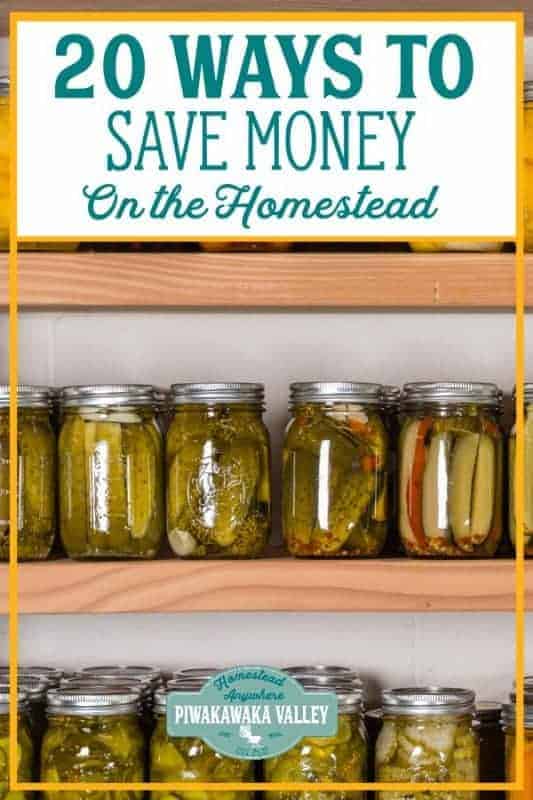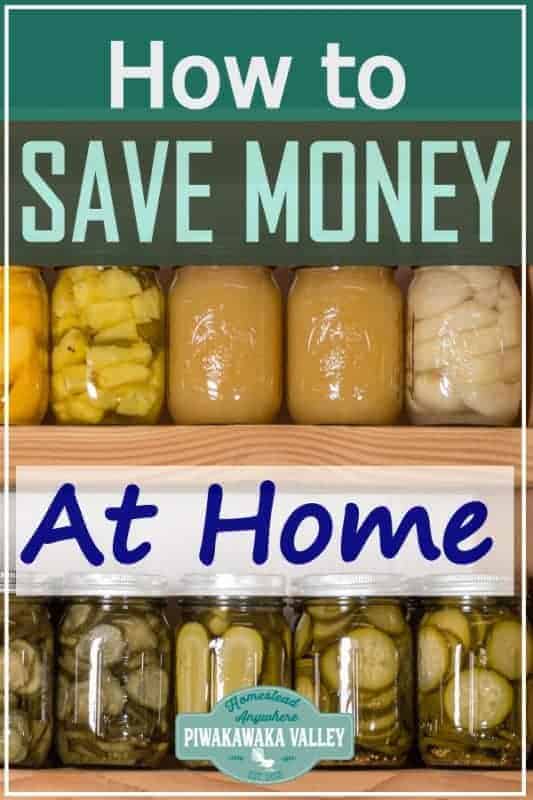This post was most recently updated on April 12th, 2023
Are you looking for ways to save money on the homestead? Homesteading and self sufficient living is touted at the ultimate option for frugal living, but truth be told, it can be pretty expensive if you are doing it wrong!
Please read: This information is provided for educational purposes only and is not intended to treat, diagnose or prevent any disease. We encourage you to make your own health care decisions in partnership with a qualified health care professional.
This post contains affiliate links, this means at no extra cost to you, we make a commission from sales. Please read
our Disclosure Statement
Your life can change in under a year, ordinary folks can have a truly extraordinary impact, while living a life that feels aligned to you. AND you can get it to pay for itself so you don’t need to wait 10 years of working a day job to get there.
Here are 20 sensible ways that you can actually save money on the homestead or around the home
Save Money with Animals
If you are keeping animals on your property, be it in your urban backyard, or out in the country, you will know that animals are not cheap to keep or feed. And don’t get me started on the vet bills!
1. Eggs
Keeping chickens for eggs is one of the best ways of saving money on the homestead. This is even more true if you can run your own rooster and breed your own chicks.
Free range, pasture raised eggs are the best around, and you will pay through the nose at the store for these. However free ranging your chickens and letting them scrounge for their own food is a great way of feeding them very cheaply.
We found that if we keep a large flock of 30-40 birds we can sell the excess eggs to friends and family to pay for both the hens and the meat rabbits grain feed.
RELATED POST: How to halve your chicken feed bill
2. Meat animals
Even if you live in an urban house, you can raise some animals for meat. Quail, chickens and rabbits are all small and easy options.
Raising your own meat becomes more and more viable, the more free feed (think grass and other plants) that you can access and use.
RELATED POST: The best animals to raise for meat
3. Dairy animals
If your family drinks milk and eats cheese, raising an animal that makes milk is a sensible choice as long as you have enough food for it.
If you have a large block, a house cow or some full sized dairy goats are perfect. If you are living in the city, some people even raise the little Nigerian Dwarf goats in town.
4. Breed excess and sell them
While this is more in the making money on the homestead sort of side. It is a sensible choice to help save you money and offset the feed costs of your other animals.
Dairy animals need to have a baby every year (or every second year for some) and it makes sense to sell that baby on after weaning. There is a limit to how many you can keep at your place!
Heritage chickens often sell well if you can get some to sit on a clutch of eggs in the spring time.
RELATED POST: How to make money homesteading


Save Money by Gardening
5. Use own compost and manure
If you are raising your own animals, it makes sense to use their poop to enrich your garden. Why buy in compost when you can use your chickens to make your own?!
RELATED POST: Using chickens to make compost
6. Grow your own food
Growing your own food in a garden is one of the best ways to save money at home. Growing a garden is cheap, and can be a very rewarding pastime.
It doesn’t have to take a lot of time out of your busy week to grow a garden! Using my methods, you can have a flourishing, productive garden in less that an hour a week. Find out how here.
7. Grow only what food you will eat
There is absolutely no point in growing food that your family will not eat. Only choose to plant the family favorites.
Each year we grow one crop as an experiment, sometimes we love it, sometimes it is gross. If we get a dud, it usually goes to the chickens.
Generally we stick to things like peas, beans, onions, garlic, potatoes, leafy greens and tomatoes. Keep it simple, keep it safe, keep it cheap and affordable.
8. Eat seasonally
Even if you aren’t growing your own food, if you learn to eat what is in season, you will save a lot on your grocery bill. If you have your heart set on fresh tomatoes and avocado in the middle of winter, you are going to pay up to 10 times as much as you would have if you waited for mid season specials.
In the summer you have all those things that are fresh and juicy – tomatoes, peppers, lettuce, new carrots, new potatoes, sweet corn
Over winter it tends to be more root crops, brassicas (cabbage, broccoli, cauliflower etc) and dark leafy greens – carrots, winter squash, beets, swiss chard.
RELATED POST: 10 Easiest Vegetables for Beginners
9. Grow from seed
If you can, growing plants from seed has two main benefits:
- You get to choose from a better range of varieties
- It is a lot cheaper
You can buy a whole cabbage for $3 or a punnet of 6 cabbage plants for 3 dollars OR a packet of 100 seeds for $3. I know which I prefer.
Saving Money in the House
10. Preserve vegetables
If you are growing your own vegetables, it is sensible to preserve the excess. If you are at the store and find a super good deal on a food that your family actually eats, buy a good volume of it and take it home to preserve.
Preserving foods like peppers, tomatoes and corn, or other things that the price skyrockets over the ‘off-season’ will save you plenty in your cooking.
Acidic vegetables and fruits can usually be canned via the water bath method. I personally use the overflow method with syrup for fruit like peaches and apricots.
Non-acidic vegetables will need to be made in to chutney or pickle, or you can use a pressure canner to preserve them in simply brine or water.
RELATED POST: Pressure Canning for Beginners
Many vegetables can be lightly blanched and then frozen – peas, corn, carrots, broccoli, cauliflower are all good candidates for this option.
Be sure to label your bags well, and use them within 6 months. I prefer to use these reusable silicone bags.
11. Cook from scratch
Learning to cook from scratch is a life skill that we neeeeeeeed to be passing on to our children. Knowing how to throw together simple, seasonal food from scratch is SO central to saving money.
I love this book by Shay Elliot. She is a fellow homesteader and mom, and she gets cooking on a budget.
We also make our own sourdough bread, sauerkraut and kombucha.
12. Buy in bulk
Buying in bulk is a powerful frugal move. Bulk toilet paper, bulk flour, bulk sugar, bulk meat (like a whole cows worth) if you have the space and storage, bulk buying the the way to go!
If you are storing dried goods, make sure your bins are totally sealed and mouse proof!
I find that if we set aside $30 a week in to a meat account, by the time the beef has run out, we have enough set aside pretty much to buy another whole beast.
13. Line dry
I have grown up without a drier and we also don’t own one now. Not only is it better on your clothes to be int he sun rather than a tumble drier, it is much better for your pocket as well!
During the winter, or wet days, we have a ladder that hangs from our ceiling on a pulley and we put our clothes up there.
14. Cold wash
Along with line drying we basically only ever wash our clothes in cold water. In fact I only have one hose to our washing machine, so if I want it hot, I have to manually swap it over.
With a good laundry detergent, we have never had a problem with only using cold water.
DIY to save money
15. DIY gifts
Our birthdays and Christmas’ contain a lot of DIY gift ideas. Here are a few
16. Build it and fix it yourself
A chicken coop, a shed or almost anything can be done by you once you have some tools and some knowhow
Youtube is your best friend for DIY building and fixing.
Thanks to youtube in the last year we have fixed a chainsaw, fridge, dishwasher, vacuum cleaner and washing machine all from youtube DIY videos!
17. Fencing
If there is one thing on a farm that you cannot afford to screw up, it is your fencing. Luckily fencing is not that tricky once you know how.
Ask a local farmer to show you the ropes, or jump on youtube again.
18. Use secondhand materials
Not everything has to be brand new. We have just built a new house, and our windows, kitchen cupboards, laundry fittings and bathroom fittings are all second hand. And I am OK with that. Our animal sheds are mostly second hand (free) roofing iron and they are just fine for what we need right now.
19. Reassess everything
At the end of each season it is really helpful to see where your money, time and effort is going, and what is and isn’t paying off.
In NZ our meat rabbit pellets are very expensive, and thanks to RCD on our property we dare not feed out grass. So we have discovered that our rabbits are costing us about $15 per kg of (bone in) meat.
So sadly, we are giving up on the meat rabbits for now.
We have had sheep in the past, but the bottom of our property gets boggy in the rain, and we lost 3 sheep in a week to the bog.
Our cow found the property too steep and slipped and broke her tail one day. So we are switching to Boer goats.
Live and learn eh.
20. Invest in your future
If you want to be doing this for a long time, you need to think about what things are worth investing in right at the start to do it right forever.
Fencing is one thing that you don’t want to have to be re-doing in 10 years, so do it right from the beginning and buy the proper materials.
Animal sheds should be built well, from tanalised timber so they don’t rot in 3 years and blow away.
Spend some money as soon as you can on things that will pay off later like fruit and nut trees.
Sometimes investing in learning how to do something properly (like learning to garden so that things actually grow!) is worth spending in to. Education is always worth the money, knowledge is power and the ability to do things for yourself.
20 Sensible ways you can Save Money on the Homestead
Don’t throw your money away. Spend an evening thinking about where your money is actually going and how much of it is going there.
Is it sustainable like that? Is there a better place that money could be going.
Making some small changes on the homestead can save you significant amounts of cash!



